History
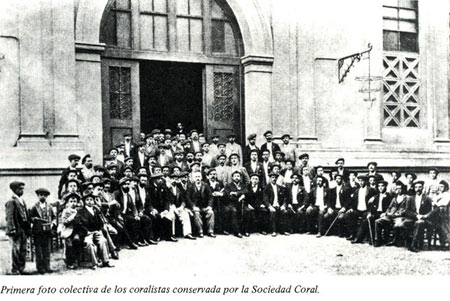 1886-2014
1886-2014
Founded as the Orfeón Bilbaino in June 1886, and later renamed the Sociedad Coral de Bilbao on the 3rd of August that same year, it was formed with the aim of promoting awareness and spreading music in general, choir singing in particular
Early Performances
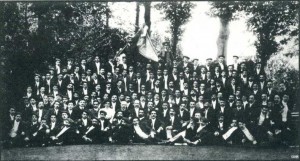 From its early beginnings it showed its promiseon a national and international stage, participating in the following events:
From its early beginnings it showed its promiseon a national and international stage, participating in the following events:
– Grand International Music Competition, he City of San Sebastian (1886) – The International Choir Competition in Madrid (1887) – The International Choir Competition of the Basque Festivals in Gernika (1888) – The International Choir Competition in Barcelona (1888) – The International Choir Competition in Santander (1890) Grand International Music Competition in San Sebastian (1890) – Grand International Music Competition of Harmony Music, Fanfares and Choirsin San Juan de Luz (1891) – Commemorative Competition for the 5th Centenary of the Discovery of America, Madrid (1892) – The International Choir Competition at the Universal exposition in Barcelona (1892) – Grand International Music Competition, of Harmony Music, Fanfares and students inla Ville de Biarritz (1893) – The International competition of Choirs and Bands in Pamplona (1894) – Grand National and International Music Competitionin la Ville de Marseille (1897) – Grand International Music Competition, Choirs, Harmonies, Fanfares in la Ville de Bordeaux (1898) – Grand International Music Competition in the City of San Sebastian (1902) – Grand International Music Competitionin la Ville de Bordeaux (1904) – The International Choral Competitionin la Ville de Verviers, Belguim (1905) Achieving First Place in all.
1905, the Promotion of the Basque Voice
 Since 1905,the initial choir has incorporated, definitively and permanently the female voice, resulting in a mixed choir with 200 choristers, and bringing in a new era, and refuses to compete in competitions. During this period, the Choral Society of Bilbaoassumed responsibility of promoting Basque Operas, premiering:
– Maitena, de Charles Colin (1909)
– Mendi Mendiyan, by José Mª Usandizaga (1910)
– Lide ta Ixidor, by Santos de Inchausti (1910)
– Mirentxu, by Jesús Guridi (1910)
– Deboika, by José Power and Pedro Martínez (1914)
– Amaya, by Jesús Guridi (1920)
Since 1905,the initial choir has incorporated, definitively and permanently the female voice, resulting in a mixed choir with 200 choristers, and bringing in a new era, and refuses to compete in competitions. During this period, the Choral Society of Bilbaoassumed responsibility of promoting Basque Operas, premiering:
– Maitena, de Charles Colin (1909)
– Mendi Mendiyan, by José Mª Usandizaga (1910)
– Lide ta Ixidor, by Santos de Inchausti (1910)
– Mirentxu, by Jesús Guridi (1910)
– Deboika, by José Power and Pedro Martínez (1914)
– Amaya, by Jesús Guridi (1920)
Through our ups and downsand times of good and bad fortune, we aspire to our dreams of days of perfection.
Directors
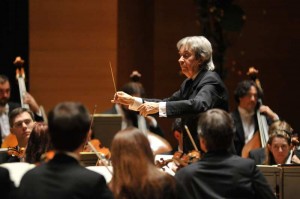 Those that have directed the Choral Society of Bilbao, amongst others, have been the maestros: Cleto Zavala, Aureliano Valle, Jesús Guridi, Arturo Inchausti, Jesús Arámbarri, Modesto Arana, Rafael Frühbeck de Burgos, Gorka Sierra, Iñaki Moreno, Joan Cabero y, en la actualidad, Julio Gergely.
Those that have directed the Choral Society of Bilbao, amongst others, have been the maestros: Cleto Zavala, Aureliano Valle, Jesús Guridi, Arturo Inchausti, Jesús Arámbarri, Modesto Arana, Rafael Frühbeck de Burgos, Gorka Sierra, Iñaki Moreno, Joan Cabero y, en la actualidad, Julio Gergely.
Sus coros han actuado a las órdenes de directores de orquesta de reconocido prestigio internacional como: Ataulfo Argenta, Enrique Fernández Arbós, Bartolomé Pérez Casas, Wladimir Golscham, Juan Lamote de Grignon, Jasecha Horenstein, Sir Malcom Sargent, Odón Alonso, Enrique García Asensio, Antoni Ros Marbá, Miguel Ángel Gómez Martínez, Mstislav Rostropovich, Theo Alcántara, Michel Plasson, Víctor Pablo Pérez, Jan Lathan-Koening, Aldo Ceccato, George Prete, John Nelson, Uriel Segal, Josep Pons, Arturo Tamayo, José Ramón Encinar, Jerzy Semkow, Juanjo Mena, Yutaka Sado, Martin Haselböck, Michiyoshi Inoue, Christoph Spering and Jiri Belohlavek.
Relevant Releases
 The Choral Society of Bilbao has premiered in Spain:
The Choral Society of Bilbao has premiered in Spain:
– The Beautitudes (1907), Ruth (1908), Redemption (1909), Rebecca (1909) and Psyche (1919), by C. Franck – Faust (1908), by R. Schumann – Dinner of the Apostles (1895), Parsifal (fragments) (1914), The Master Singers (1916) (fragments), by R. Wagner – Song of The Spirits Over The Waters (1901), by F. Schubert – Christmas Oratorio (fragments) (1901), by J. S. Bach – Olav Trygvason Norwiegen Mythology (1901), by E. Grieg – The Damnation of Fausto (1909), by H. Berlioz – The Passion os St Matthew(fragments) (1912), by J. S. Bach – A German Requiem (1913), by J. Brahms – L’Arlesienne (1916), by G. Bizet – The Dance of Prínce Igor (1919), by A. Borodin – Requiem (1934), by G. Verdi – Psalm XLVII (1943), by F. Schmitt – Elíjah (1953), by F. Mendelssohn – Solemn whispers of a Confessor (1956), by W. A. Mozart – Carmina Burana (1960), by C. Orff – Hodie (1997), by R.Vaughan-Williams – Requiem (2003), by G. Ligeti – Spring Symphony (2012), by B. Britten
And on the world stage:
– Basque Paintings (1931), by J. Guridi – Castilla (oratorio) (1941), by J. Arámbarri – Illeta (cantata) (1955) y Gernika (ópera) (1987), by F. Escudero – Gernika (oratorio) (1990), by G. Sierra – Medea (ópera) (1991), by M. Theodorakis – Euskadi. Euskarari Abestia (1995), by C. A. Bernaola
Great Orchestras
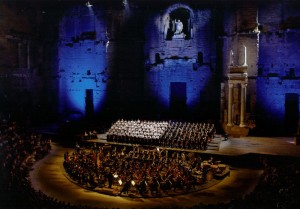 Since 1986, when they toured Puerto Rico, accompanied by the National Orchestra of Puerto Rico, led by its ownerOdón Alonso, they have intensified their participation in concerts and festivals, not only in Spain, but also in France, Portugal and Germany. They have performed together with almost every major orchestra in Spain, and abroad, such as, The Moscow Symphony Orchestra, Orchestra Radio-Diffusion Portuguesa, National Orchestra of Bordeaux Aquitania, National Orchestra du Capitole of Toulouse, Lyon, The Royal Philharmonic Orchestra, Budapest Symphony Orchestra, Berlin Philharmonic, Symphony Orchestra of Aachen, Ensemble InterCompetorian Paris, Orchestra Lamoureux, Orchestra Wiener Akademie, Szeged Symphony Orchestra, Tokyo Metropolitan Symphony Orchestra and the BBC Symphony Orchestra.In this list of international projects we must mention, in May of 2006 the put on several concerts in the Japanese capital, with the Metropolitan Symphony Orchestra in Tokyo.
Since 1986, when they toured Puerto Rico, accompanied by the National Orchestra of Puerto Rico, led by its ownerOdón Alonso, they have intensified their participation in concerts and festivals, not only in Spain, but also in France, Portugal and Germany. They have performed together with almost every major orchestra in Spain, and abroad, such as, The Moscow Symphony Orchestra, Orchestra Radio-Diffusion Portuguesa, National Orchestra of Bordeaux Aquitania, National Orchestra du Capitole of Toulouse, Lyon, The Royal Philharmonic Orchestra, Budapest Symphony Orchestra, Berlin Philharmonic, Symphony Orchestra of Aachen, Ensemble InterCompetorian Paris, Orchestra Lamoureux, Orchestra Wiener Akademie, Szeged Symphony Orchestra, Tokyo Metropolitan Symphony Orchestra and the BBC Symphony Orchestra.In this list of international projects we must mention, in May of 2006 the put on several concerts in the Japanese capital, with the Metropolitan Symphony Orchestra in Tokyo.Recordings
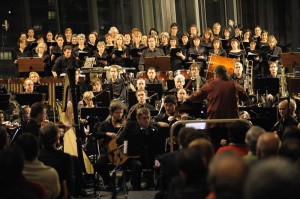 The Choral Society of Bilbao has recorded the following discs:
– Misa Criolla by Ariel Ramírez, together with the Coral Salvé, the tenor José Carreras and our own Ariel Ramírez on piano. Director, José Luis Ocejo.
– Herodiade de Massenett, with the National Orchestra of Capitole de Toulouse.Director, Michel Plasson.
– Alegrías by A. García Abril, with the Symphony Orchestra of Galicia. Director, Víctor Pablo Pérez.
– Goyescas by E. Granados, with the Ochestra of Cadaqués. Director, Gianandrea Noseda.
– Agur Jaunak Music by various Basque Authors with the National of Capitole de Toulouse.Director, Michel Plasson.
– Amaya by J. Guridiwith the Symphony Orchestra of Bilbao. Director, Theo Alcántara.
– El Caserío by J. Guridiwith the Symphony Orchestra of Bilbao. Director, Juan José Mena.
– So Sing the Boysby J. Guridi with the Symphony Orchestra of Bilbao. Director, Juan José Mena.
– Sorozábal Various Works by P. Sorozábal with the Symphony Orchestra of the Basque Country. Director, Christian Mandeal.
– Turandot by G. Puccini, with the Philharmonic Orchestra of Málaga. Director, Alexander Rahbari.
– Concert to Commemorate the XXV anniversary of the Spanish Constitution (Spanish, European and South American church music). Director, Gorka Sierra.
– Gernika by F. Escudero, with the Symphony Orchestra of the Basque Country. Director, José Ramón Encinar.
– Katiuska by Pablo Sorozabal (DVD) an Arriaga Theatre Production with the Symphony Orchestra of Bilbao. Director, David Giménez Carreras
– 125 Urte Kantuan-Singing through 125 years. Basque Music by various Authors with the Municipal Band of Bilbao. Director, Iñaki Urkizu.
– BBVA Christmas Concert. 125th Anniversary of the Choral Society of Bilbao. Basque Music by various Authors with the Municipal Band of Bilbao. Director, IñakiUrkizu.
– Pop Music. Choir and piano versions of various pop music classics. Director, Urko Sangroniz
The Choral Society of Bilbao has recorded the following discs:
– Misa Criolla by Ariel Ramírez, together with the Coral Salvé, the tenor José Carreras and our own Ariel Ramírez on piano. Director, José Luis Ocejo.
– Herodiade de Massenett, with the National Orchestra of Capitole de Toulouse.Director, Michel Plasson.
– Alegrías by A. García Abril, with the Symphony Orchestra of Galicia. Director, Víctor Pablo Pérez.
– Goyescas by E. Granados, with the Ochestra of Cadaqués. Director, Gianandrea Noseda.
– Agur Jaunak Music by various Basque Authors with the National of Capitole de Toulouse.Director, Michel Plasson.
– Amaya by J. Guridiwith the Symphony Orchestra of Bilbao. Director, Theo Alcántara.
– El Caserío by J. Guridiwith the Symphony Orchestra of Bilbao. Director, Juan José Mena.
– So Sing the Boysby J. Guridi with the Symphony Orchestra of Bilbao. Director, Juan José Mena.
– Sorozábal Various Works by P. Sorozábal with the Symphony Orchestra of the Basque Country. Director, Christian Mandeal.
– Turandot by G. Puccini, with the Philharmonic Orchestra of Málaga. Director, Alexander Rahbari.
– Concert to Commemorate the XXV anniversary of the Spanish Constitution (Spanish, European and South American church music). Director, Gorka Sierra.
– Gernika by F. Escudero, with the Symphony Orchestra of the Basque Country. Director, José Ramón Encinar.
– Katiuska by Pablo Sorozabal (DVD) an Arriaga Theatre Production with the Symphony Orchestra of Bilbao. Director, David Giménez Carreras
– 125 Urte Kantuan-Singing through 125 years. Basque Music by various Authors with the Municipal Band of Bilbao. Director, Iñaki Urkizu.
– BBVA Christmas Concert. 125th Anniversary of the Choral Society of Bilbao. Basque Music by various Authors with the Municipal Band of Bilbao. Director, IñakiUrkizu.
– Pop Music. Choir and piano versions of various pop music classics. Director, Urko Sangroniz Relevant awards
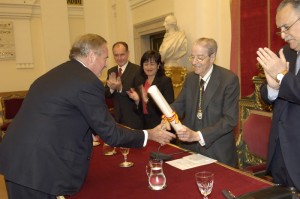 The Choral Society has received in recent years the following awards:
– The Fine Arts Gold Medal of Merit (1986)
– The Chamber of Commerce Centenary Gold Medal, Industry and Seamanship of Bilbao (1986)
– The Gold Medal of the Federation of Choirs in Vizcaya (1986)
– The 50th Anniversary Medal of the Foundation of UNICEF (1996)
– Named a social Collective by The Bascongada Royal Society, Friends of the Country (1997)
– The Andrés de Mañaricua y NuereAward, awarded by the Diputación Foral de Bizkaia (1998)
– Sabino Arana Foundation award, in the Society category (2001)
– UNICEF Medal (2003)
– The Medal of Honor at the Royal Academy of Fine Arts in San Fernando (2005)
– Omenaldia Ibilaldia-A homage to the fiestas of the Ikastolas of Vizcaya,for their continued workin Basque Folkmusic and Basque (2005)
– The Gold Medal of la Villa de Bilbao (2007)
– “Ambassadors of the Txakoli of Vizcaya”, named so by the Consejo de Denominación de Origen de Bizkaiko Txakolina (2007)
– Dama Bilbaina, awarded by the Bilbaina Society (2013)
The Choral Society has received in recent years the following awards:
– The Fine Arts Gold Medal of Merit (1986)
– The Chamber of Commerce Centenary Gold Medal, Industry and Seamanship of Bilbao (1986)
– The Gold Medal of the Federation of Choirs in Vizcaya (1986)
– The 50th Anniversary Medal of the Foundation of UNICEF (1996)
– Named a social Collective by The Bascongada Royal Society, Friends of the Country (1997)
– The Andrés de Mañaricua y NuereAward, awarded by the Diputación Foral de Bizkaia (1998)
– Sabino Arana Foundation award, in the Society category (2001)
– UNICEF Medal (2003)
– The Medal of Honor at the Royal Academy of Fine Arts in San Fernando (2005)
– Omenaldia Ibilaldia-A homage to the fiestas of the Ikastolas of Vizcaya,for their continued workin Basque Folkmusic and Basque (2005)
– The Gold Medal of la Villa de Bilbao (2007)
– “Ambassadors of the Txakoli of Vizcaya”, named so by the Consejo de Denominación de Origen de Bizkaiko Txakolina (2007)
– Dama Bilbaina, awarded by the Bilbaina Society (2013)

